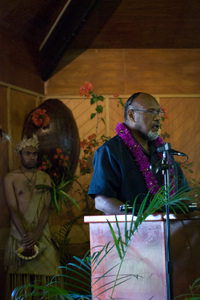[Originally published in the Vanuatu Daily Post.]
 Vanuatu welcomed over 140 attendees from Vanuatu and throughout the Asia-Pacific region this week to the annual PacINET technology conference. It was organised by the Pacific Islands Chapter of the Internet Society (PICISOC) and by the Vanuatu IT Users Society (VITUS).
Vanuatu welcomed over 140 attendees from Vanuatu and throughout the Asia-Pacific region this week to the annual PacINET technology conference. It was organised by the Pacific Islands Chapter of the Internet Society (PICISOC) and by the Vanuatu IT Users Society (VITUS).
At Wednesday’s opening ceremony, Prime Minister Edward Nipake Natapei highlighted Vanuatu’s leadership role in driving technological development in the country.
“The effects,” he said, “have been revolutionary. As a result of our telecommunications policies, economic activity has increased, adding an additional 1% to GDP growth at a time when the world economy was shrinking. Studies show that social bonds are strengthened, too, making families safer and stronger in a time of increased mobility and migration.”
The theme of this year’s conference is ‘Next Generation Internet: Security and Governance’. Among the highlights were deployment through the Pacific region of a new Internet protocol that will allow Internet-based businesses and organisations to continue to grow, a day-long investigation of the One Laptop Per Child project and another all-day workshop aimed at school principals – key stakeholders in ICT for development in Vanuatu.
Backing all these efforts is something people in Vanuatu understand better than most in the world – a thriving Pacific ICT community willing to share knowledge, experience and insight to make life better, not just for IT geeks, but for everyone.
Without the efforts of a devoted band of volunteers, the success of information and communications technologies (ICT) as tools for development would be severely limited. While the developed world has benefited significantly from entrepreneurialism and business development to drive technological advancement, the soul of the Pacific lies in the sense of community service that we all share.
Our resources are limited, we rely (some say too much) on donor aid for most improvements in our day-to-day lives, and though market players such as TVL have a tremendously influential role to play, their success is largely contingent on the willingness and capacity of the community to take advantage of their products and services.
Indeed, one the defining characteristics of these commercial operations is their close ties to the local community. Every day we saw TVL staffers contributing time and attention to ensuring the conference ran smoothly. Many attendees commended the quality and performance of the WiMax broadband link donated by TVL, one of the largest deployed to date in Vanuatu. The consensus is that it was every bit as good as they’d seen in conferences in Australia or New Zealand.
But all the Internet bandwidth in the world won’t help us if we don’t make the most of what we have. It was for this reason that conference organisers decided to concentrate on the next generation of Internet technologies. All week long, IT professionals focused on the deployment of a new kind of addressing system for the Internet.
Called IPv6, this protocol will allow the Internet to continue to grow in the years to come. Just as every mobile phone needs its own number, every computer connected to the Internet requires a unique address in order for others to be able to talk to it. The first allocation of about 4 billion numbers is about to run out, and unless action is taken, this will severely limit the growth of the Internet in the Asia-Pacific region.
Once we’ve assured that everyone can get an address, the next task is to help people find a way to make use of those addresses. That’s why PacINET 2010 organisers helped arrange a meeting between Michael Hutak, Oceania director of the One Laptop Per Child project and the Prime Minister. PM Natapei showed his continuing commitment to the development of a comprehensive ICT policy, promising his support for a year long trial of up to 2000 of these robust, low-cost and low-power devices in Vanuatu’s outer islands.
Following the meeting, Hutak was quick to point out that one cannot simply parachute laptops into a community and expect everything to work swimmingly. “Follow up,” said Hutak, “is crucial.”
He was preaching to the choir. Led by volunteer George Tasso with significant support from the Department of Education, VITUS members organised a full-day event for school principals aimed at informing them of the perils and profits involved in ICT deployment in schools.
Tasso and others have been working for over a year now with local IT volunteers, pairing them up with schools in Port Vila and organising high-level support and assistance from more experienced VITUS members. The result is that young volunteers not only get the opportunity to learn from more experienced colleagues, but schools benefit from no-cost, on-site technical support.
This week’s workshop featured the announcement of a partnership between Edwards Computer Foundation and Vanuatu schools in which IT graduates will be paired with a mentor from within the VITUS community and given the opportunity to spend time in a post-graduation work-study programme in community schools.
The Internet helps make old things new again. It provides a new and powerful way to ensure that the bonds of family and society continue to tie everyone in Vanuatu together. At this year’s PacINET conference, we saw yet again how strong communities make society healthier and more able to develop itself.
